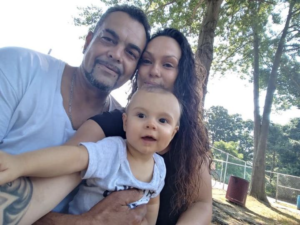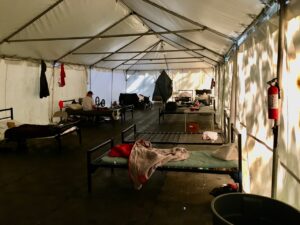 St. Luke’s Guesthouse – Temporary Shelter – Sheltering for Self-Sufficiency
St. Luke’s Guesthouse – Temporary Shelter – Sheltering for Self-Sufficiency
In the Beginning…
It was not a Noah experience! God didn’t say, “Go and build a homeless shelter!” It happened slowly over time, with inspiration from the Holy Spirit and matching resources with a need.
It started in the year 2000 when my husband John, a family physician, went back into private practice and bought a large Victorian house in Southbridge, MA. He planned to use only about one-quarter of the space for his medical practice, but the house came complete with apartments and tenants.
Over the next few years tenants came and went. The realities of being a landlord became clearer and more complex, along with the realization that we were not called to be, nor good at, being landlords. When our last long-term tenant moved out in 2013, we decided to let the apartments lie fallow for a while to see where God was calling us in this new chapter.
It didn’t take long before my husband saw a patient who had lost his job, lost his apartment and was homeless. John said, “We have some space upstairs. Why don’t you stay in our vacant apartment until you can get back on your feet?” The young man stayed for a month or so, got a job and an apartment, and moved on. This inspired John to keep watch for other people, and sometimes families, who needed the same opportunity. Three years later we had an informal homeless shelter in our old Victorian house.
 Into the Wilderness…
Into the Wilderness…
We were meeting the needs of homeless people, but the informal structure led to a series of problems. The reality is that people who are experiencing homelessness have walked a hard road, which creates a variety of psychosocial problems: mental illness and substance abuse as examples. To complicate matters we had no paid staff; John and I took care of all the details of interviewing, policies, rules, a modicum of social support, paying bills, maintenance, cleaning and other details.
It was finally the bedbugs that forced us to make a dramatic change. As we tried to empty the house to exterminate the vermin, our “guests” refused to leave and we were forced to evict them. We closed the house for two months to re-envision a better program and work on the difficulties we encountered. We looked into housing law, spoke to lawyers (who said steer clear of homeless shelters!) and finally tapped into the wisdom of a longstanding homeless shelter for women, Abby’s House in Worcester, MA.
The Next Stage of the Journey…
On January 1, 2017, we formed an ecumenical Board of Directors, incorporated as Friends of St. Luke’s, became a nonprofit organization, and launched St. Luke’s Guesthouse, an 11-bed short-term shelter modeled on the best practices we had learned.
St. Luke’s Guesthouse is now the only homeless shelter for men, women and children in southern Worcester County, Massachusetts. Our mission is to provide Christian hospitality and support self-sufficiency. Our vision is that all people who are homeless in southern Worcester County will have a place to experience Christian hospitality and receive tools for self-sufficiency.
Located in the center of Southbridge, the Guesthouse has seven bedrooms to accommodate a combination of single and married family guests. Rooms are fully furnished, and containers are provided for guests’ personal belongings and clothing. Guests are responsible for preparing their own food in the Guesthouse kitchens and expected to follow common sense house rules including staying drug and alcohol free. Guests meet regularly with a guest advocate for case management and connection with appropriate resources for self-sufficiency. Monday through Saturday from 9 a.m. to 3 p.m., our guests are required to be out of the house, either working, looking for work, or otherwise contributing to the health of their family and the community. Our guests may remain in the house on Sundays and holidays for rest and personal time.
In 2019, the Guesthouse provided short-term shelter for 89 guests. All adult guests worked extremely hard on employment search and budgeting with the Guesthouse staff and were able to save close to 75% of their income. Their savings allowed those with enough income to afford first/last security deposit to transition out of shelter back into an apartment in the community.
How Do We Pay for the Guesthouse Operations?
In 2013 the Guesthouse was privately funded, and the space and some utilities are donated “in-kind.” In 2017, when we became a nonprofit corporation and were granted 501c3 status, we were able to launch fundraising initiatives. In 2017 we applied for a United Way Grant and received $10,000. Reaching out to local banks and foundations we found financial partners for our mission. We have developed a wide network of churches and individuals who support our effort financially, with in-kind gifts, and with prayer. With this funding, over the past three years we have been able to hire staff – a director, case manager, overnight and security staff – and pay the operational expense of the Guesthouse. We publish a quarterly newsletter to let our supporters know about what’s happening at the House. Only with the help of our community partners have we been able to meet our mission and vision.
Success Stories…
“Bobby,” a middle-aged gentleman, had been homeless for months. Bobby never had a steady job, had little income and struggled with sobriety. He got occasional work painting houses, doing yardwork and cleaning out basements. Bobby wanted more out of life. Unsure of what he wanted to do for work, he knew he wanted an education. Bobby had dropped out of school in the 10th grade and began drinking. Eventually, his life spiraled out of control and he lost everything. When Bobby was accepted into the shelter, our case manager referred him to the Tradewinds Clubhouse, where he was provided support toward obtaining a GED. Over the course of a couple of months, Bobby studied diligently with support from his peers and staff at the guesthouse. He received his GED, found employment and finally found affordable housing. Bobby continues to maintain sobriety and is happy and healthy.
 “Britney,” “Chris” and “Baby G” had a lot of challenges when they arrived at the Guesthouse. We worked closely with them to set up goals and a plan. They put together a budget and began to save money to get an apartment. They started going for counseling to sort out and cope with the many hardships they had endured. During their time with us, Chris and Britney hit walls and were ready to give up, but with support from the staff they persisted and regained hope for a better future. Chris found a good job and they were able to save 75% of his paycheck. With help they were able to find an apartment. It was a happy day when they left the Guesthouse for a place they could now really call home.
“Britney,” “Chris” and “Baby G” had a lot of challenges when they arrived at the Guesthouse. We worked closely with them to set up goals and a plan. They put together a budget and began to save money to get an apartment. They started going for counseling to sort out and cope with the many hardships they had endured. During their time with us, Chris and Britney hit walls and were ready to give up, but with support from the staff they persisted and regained hope for a better future. Chris found a good job and they were able to save 75% of his paycheck. With help they were able to find an apartment. It was a happy day when they left the Guesthouse for a place they could now really call home.
“Martha,” a middle-age woman, came to us homeless and broken. She had suffered from years of domestic violence, become addicted to heroin and lost everything. We welcomed her into the house and helped her get into drug treatment. We gave her the time she needed to begin to heal emotionally, and she got a part-time job. She helped around the house with yardwork – a real hard worker. Martha had rough times; complications from surgery almost drove her back to using drugs. But she was tough. Our guest advocate met with her twice a week and they talked over the phone frequently. For the first time in years Martha was able to visit with her grandchildren; what a joy that was. Bit by bit she saved her money. She made friends with a handicaped person also looking for an apartment, and the two together were able to afford the rent. Once homeless and broken, Martha is now home and healing.
Some Days Are Tough…
Running a homeless shelter is hard work and often heartbreaking. Those who become homeless suffer from a range of problems including severe mental illness, trauma, addiction, chronic health problems, lack of education and alienation from family and community. One of our guests was a young woman who had been on the streets for months. She suffered the emotional effects of physical and sexual abuse and had been addicted to heroin for many years. But she was trying to get back on track. She got into drug treatment and came to us for shelter. She began counseling and psychiatric care. Sadly, she relapsed into active drug abuse and we had to ask her to leave the Guesthouse. Those days are tough, when we have to put someone back on the street.
The COVID-19 Crisis…
The first case in Massachusetts of COVID-19 occurred in early February. By early March it was clear that the virus would have a tremendous impact. Homeless shelters across the state, including ours, feared that they would become hotspots of the infection. When the Guesthouse is fully occupied there’s no way to practice social distancing—everyone is sharing bathrooms and kitchens and congregating in our small space. We stopped accepting news guests to prevent overcrowding in the house, though it’s always hard to have to say no to someone seeking shelter. On March 18 our governor issued a stay-at home advisory. With public spaces like libraries and coffee shops closed, the homeless even lost access to toilets. We became very concerned about the people on the street, their health, vulnerability to illness and potential to spread the virus. The first thing we did was order a portable toilet for public use near the sidewalk on Main Street where the Guesthouse is located. That was a simple, down-to-earth way to help those on the street. But how do you run a homeless shelter in the midst of an epidemic? It was a real challenge! Our executive director and case manager normally worked out of a small office on the second floor of the house—in close contact with our guests. They grabbed their computers and important files, locked the office and began working remotely from home. We also had to furlough our overnight staff temporarily to keep them safe.
By the beginning of April we had 10,000 cases of COVID-19 in Massachusetts. Homeless shelters across the state were forced to reduce capacity by as much as 75%. This created a crisis for those experiencing homelessness. We had reduced our capacity from eleven to four. Fortunately, we didn’t have to put anyone out on the street. Because of the freeze on new admissions we were down to two guests upstairs and a family of four downstairs—a mother with her three young children. We were able to help the family get into an apartment—such a relief. But in reducing our census to make the Guesthouse safe, we were forced to turn away others seeking shelter.
We heard that our state government was trying to set up temporary emergency shelters to provide additional space using large tents. So on April 4 we approached the Massachusetts Emergency Management Agency and requested help setting up a tent to provide emergency shelter space. We needed approval from various town departments including the local emergency management, fire department, health inspector and housing inspector. Amazingly it all came together—everyone realized that additional shelter space was an essential part of responding to the COVID-19 crisis.
On April 9 a 20-foot by 60-foot heated tent arrived and was set up in the yard next to the Guesthouse. We got two additional portable toilets. The next day 11 metal cots along with bedding arrived from the Department of Corrections. On April 10 we received a temporary occupancy permit from the town and two hours later welcomed our first guest, “Larry,” who had been sleeping on the street for three weeks since getting out of jail. He had nothing but the clothes on his back and a sleeping bag. We helped him take his first shower in three weeks, and while Larry was in the shower, we threw his clothes in the washing machine. While the clothes were drying, he waited while wrapped in a blanket because he had nothing else to wear. In the days that Larry was with us, we got him restarted on his psychiatric medications and helped him get a phone so he could get in touch with his sister in New Hampshire. After fighting our way through all manner of red tape, Larry was able to get back into permanent housing.
The emergency tent shelter remained in operation from April 10 until June 5. For much of that time all 11 beds were occupied and we had an additional couple sleeping in their car in the parking lot. During the course of those eight weeks of hard work, we provided 423 nights of emergency shelter and over 1,200 meals, washed about 150 loads of laundry, handed out lots of masks and went through a lot of hand sanitizer! Tamsin Lucey of Holy Trinity Episcopal Church in Southbridge and a lifelong Episcopal Church Woman organized the food service for our guests. She scoured the community for donations and signed up churches and other organizations to provide food and prepare meals for our guests. We did temperature and health checks on each guest every morning to be sure no one was developing COVID-19. We had one guest who had to be quarantined for 14 days and another who had to be isolated for three days pending test results, but amazingly we had no confirmed cases of COVID-19. Our Guesthouse staff worked hard to ensure everyone’s safety and to keep the peace in the midst of a stressful living situation. We helped guests with a range of needs from getting a new pair of socks to applying for housing assistance, obtaining phones and getting needed medication.
The emergency tent shelter was operational for two months during the “surge” in Massachusetts. With the easing of the epidemic in late May, after an exhausting eight weeks of work, we closed the tent operation on June 5. Throughout the time the tent was in operation, we had three additional guests staying in our upstairs rooms. We used the downstairs space to support the tent guests. With the removal of the tent we reopened our downstairs rooms for homeless guests—though it will not be “business as usual” for a long while. Day by day we are trying to do our part to make a difference for homeless people in our corner of God’s Kingdom.
If you would like to know more about St. Luke’s Guesthouse you can visit our website, www.stlukesguesthouse.wordpress.com, or visit us on Facebook at facebook.com/StLukesGuesthouse/.
Susan Howland
Diocese of Western Massachusetts
Province 1 ECW President

